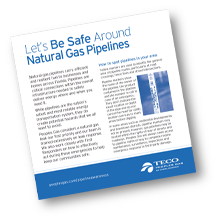
Natural gas can be hazardous and must be used and treated with caution.
If you suspect a gas leak, leave immediately – don't try to find or stop the leak. Avoid open flames and do not smoke. Do not do anything that might cause a spark, including turning on or off any electrical or battery-operated devices or using garage door openers, radios, televisions, computers or telephones. Avoid using phones or any smart devices that can be used to remotely turn on, off or open and close doors or equipment. Don't operate any vehicle or equipment that could create a spark.
Finally, do not return to the building until Peoples Gas safety experts have given the all-clear.
Recognizing a gas leak
In its natural state, natural gas is both colorless and odorless. As a safety precaution, Peoples Gas adds an odorant to natural gas to give it a "rotten egg" odor that helps alert people to the presence of natural gas. This unpleasant odor of natural gas is for your protection in the event of a leak.
Natural gas may pose a hazard, especially if released in confined spaces. It's important to be able to identify signs of a natural gas leak, especially the rotten egg-like odor that we add so that you can smell natural gas. You can recognize a natural gas leak in several other ways, including an unusual hissing noise, blowing dirt for no apparent reason, an unusual dry spot in the ground or dead vegetation for no apparent reason, a white cloud, mist, fog or bubbles in standing water, and frozen ground in warm weather.
DO NOT RELY on sense of smell alone to detect natural gas
The sense of smell for most people is a highly reliable indicator of a natural gas release. However, continued exposure to the odorant can desensitize the sense of smell. Additionally, the smell of natural gas can be masked by other odors in the area.
In certain rare situations, the odor intensity can be diminished by physical and/or chemical processes, such as when gas passes through certain soil conditions. "Odor fade" is a phenomenon that can occur when the level of odorant is reduced or becomes ineffective for various reasons including physical or chemical processes, absorption into new piping systems, absorption into soils, human insensitivity or inability to smell, among other things.
Exposure to the odor for even a short period of time may cause nasal fatigue, where a person can no longer smell the odor. If you suffer from loss of smell, nasal fatigue or recurrent ailments, such as colds, sinus conditions or allergies, you might have a diminished capability to detect a natural gas leak. In addition, the Center for Disease Control has identified the loss of smell as a potential symptom of exposure to the virus that causes COVID-19. Using tobacco, alcohol, medications or narcotics also can lessen your ability to smell odorized gas.
Peoples Gas encourages you to use all of your senses to determine the presence of natural gas.
Use a gas detector to help detect natural gas
Residential methane detectors, also called gas detectors, are commercially available and are another tool to detect the presence of gas. Gas detectors listed by the Underwriters Laboratories (UL) can be used as an extra measure of safety for detecting the presence of natural gas, especially under conditions where the odorant alone may not provide an adequate warning. Gas detectors emit a sound when gas is present and do not depend on sense of smell. We recommend installing, per manufacturer's instructions, one or more residential methane detectors. These alarms must be selected and installed according to the manufacturer's instructions. Learn more at the Gas Technology Institute.
If you suspect a leak
Remember, if you suspect a gas leak, don't try to find or stop the leak. Get everyone away from the area or out of the building immediately, report the situation to 911 and then call Peoples Gas toll free at 877-832-6747 (877-TECO PGS).
More safety information
In addition to residential gas detectors which detect the presence of gas, there are also carbon monoxide detectors that are commercially available which sound an alarm when carbon monoxide is present. In all cases, we recommend following the manufacturer's instructions for installation and proper placement. Learn more about carbon monoxide safety.
Leaks are given the utmost priority. Do not e-mail this information. Call us immediately.
Download and print our Be Safe Around Natural Gas Pipelines brochure . To request a printed version with the rotten eggs odorant, please email us.


